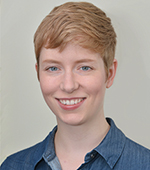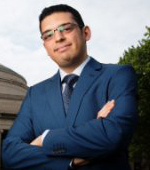Inaugural J-WAFS fellowships support crucial water security research

As the world continues to battle against the double threats of climate change and global food and water shortages, only long-term action and investment can resolve some of the biggest challenges humankind has ever faced.
The Abdul Latif Jameel World Water and Food Security Lab (J-WAFS) recognizes the severity of the situation. In doing so, it has awarded fellowship financing to three researchers from the Massachusetts Institute of Technology (MIT).
Each researcher is currently studying for a PhD, with their doctoral projects aiming to develop innovative new methods to enhance water security and quality in the world’s driest regions. Through three fellowships – the Rasikbhai L. Meswani Fellowship for Water Solutions (which makes two awards) and the J-WAFS Graduate Student Fellowship Program – J-WAFS will support their efforts during the 2017-2018 academic year.
Since its launch in 2014, J-WAFS has worked tirelessly to promote, coordinate and lead research related to water and food that will have a measurable and international impact.
Earlier this year, the fellowships attracted numerous high quality student applicants, reflecting the breadth of student research in water and water supply being performed on campus. The three projects chosen to receive fellowships were:
- Working to design engineering infrastructure that minimizes the supply planning uncertainties – including rainfall, population and climate change – across Saudi Arabia, Kenya and Australia (Sarah Fletcher).
- Building the necessary knowledge to support nanotechnology development that could ultimately deliver more efficient, sustainable and cost-effective desalination (Omar Labban).
- Developing genetically engineered microbes that could cheaply and effectively be used as water quality sensors (Tzu-Chieh Tang).
The selected students exemplify the creativity, excellence, and rigor for which MIT is renowned. In recognizing the final three successful projects, J-WAFS has again underlined its commitment to making a material and sustainable difference to the world’s future.
Keeping the taps running
The first Rasikbhai L. Meswani Fellowship for Water Solutions was awarded to Sarah Fletcher, a PhD student at MIT’s Institute for Data, Systems and Society. She is also affiliated with the Joint Program on the Science and Policy of Global Change.
Sarah’s previous education includes an undergraduate degree in physics and economics from the University of Pennsylvania, before she completed her masters degree in technology and policy at MIT. This latest fellowship will support Sarah’s research on sustainable water resource system planning during 2017/2018.
In countries like Australia, Kenya and Saudi Arabia, water is a scarce resource. Sarah aims to develop water supply planning tools that will help governments and other authorities meet their people’s needs for water. She hopes to build a framework that will model and manage the uncertainties faced by water supply planners, including inconsistent rainfall, population growth, and climate change. She will also evaluate the potential for the design of proactive, flexible engineering infrastructure and policy to minimize the risks posed by those uncertainties.
It is a complicated project, but Sarah’s multi-disciplinary background should prove beneficial. She has experience of working across systems engineering, hydrology and public policy, as well as analyzing complex problems and presenting potential solutions in clear, easy-to-understand formats.
Towards more affordable desalination
 The second Rasikbhai L. Meswani Fellowship for Water Solutions was awarded to Omar Labban, a PhD student at MIT’s Department of Mechanical Engineering, in support of his research into how and why nanofiltration can improve reverse osmosis technology for desalination. Oman also holds masters (MIT) and undergraduate (American University, Dubai) degrees in mechanical engineering.
The second Rasikbhai L. Meswani Fellowship for Water Solutions was awarded to Omar Labban, a PhD student at MIT’s Department of Mechanical Engineering, in support of his research into how and why nanofiltration can improve reverse osmosis technology for desalination. Oman also holds masters (MIT) and undergraduate (American University, Dubai) degrees in mechanical engineering.
Desalination remains one of the world’s most popular solutions in the fight against water scarcity, with around 70% of the world’s current desalination capacity in the Middle East. However, its reliance on high energy consumption, often from sources like traditional fossil fuels, and the associated environmental impact, means it is also responsible for fueling other problems. Worldwide, desalination is believed to emit 76 million tons of carbon dioxide each year. By 2040, that figure is set to treble.
Oman’s research involves three main tasks. He will investigate separation efficacy and thermodynamics; system design and economics; and membrane fouling and scaling. Through his work, he hopes to contribute to the development of nanotechnology that can ultimately be used to create more efficient and sustainable desalination procedures.
Shining a light on water quality
 Tzu-Chieh Tang, a PhD student in MIT’s Department of Biological Engineering, is the third researcher to receive a J-WAFS fellowship, as part of the 2017-2018 J-WAFS Graduate Student Fellowship Program. Tzu-Chieh is a former student at the Masdar Institute in Abu Dhabi and National Taiwan University.
Tzu-Chieh Tang, a PhD student in MIT’s Department of Biological Engineering, is the third researcher to receive a J-WAFS fellowship, as part of the 2017-2018 J-WAFS Graduate Student Fellowship Program. Tzu-Chieh is a former student at the Masdar Institute in Abu Dhabi and National Taiwan University.
He currently works as a research assistant in MIT’s Synthetic Biology Group in the Research Laboratory of Electronics (RLE), and the Mediated Matter research group at the MIT Media Lab.
Ensuring suitable water quality levels remains an ongoing challenge, but Tzu-Chieh hopes to revolutionize the practice. He is fascinated by biologically inspired engineering, and combines synthetic biology with materials design to build functional living materials that can sense, compute, memorize, and respond to environmental stimuli.
In a previous project, he was part of a team that incorporated microbes into wearable living materials which fluoresced when they encountered certain chemicals. He now hopes to develop accessible, cost-effective electrodes that can detect contaminants in water.
Joined-up thinking towards safer future for all
Each of these students follows in a historic tradition of pioneering food and water research at MIT. More than 120 years ago, Ellen Swallow Richards conducted research that led to Massachusetts establishing the first drinking water standards in America. She was followed by Samuel Cate Prescott, who developed quick-frozen foods, and John T. Dorrance, an MIT graduate who invented condensed soup.
By awarding these fellowships to the most promising water security research projects at MIT, J-WAFS continues to fulfil its original goal of bringing together the institute’s unique strengths to help solve the unprecedented challenges of food and water security facing the world today.
Funding for Rasikbhai L. Meswani Fellowship for Water Solutions is provided by Elina and Nikhil Meswani and family. The J-WAFS Graduate Student Fellowship is supported by the J-WAFS Research Affiliate program. Xylem, Inc., has provided funding that supports this year’s fellowship award. For more information about the J-WAFS Graduate Student Fellowship, visit www.jwafs.mit.edu.


 Added to press kit
Added to press kit


